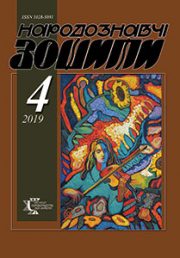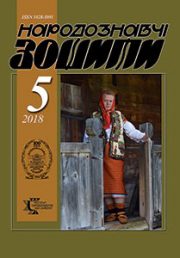The Ethnology Notebooks. 2024. № 6 (180), 1532—1540
UDK 76 (477.83-251 (091) (092)
DOI https://doi.org/10.15407/nz2024.06.1532
THE ONTOLOGY OF CARNIVAL BY YURI CHARYSHNIKOV
BANTSEKOVA Anna
- ORCID ID: https://orcid.org/0009-0008-6639-6315
- PhD of Art History, Leading Specialist of the Graphics Fund
- of the Department of Scientific and Collection work
- of the Lviv National Gallery of Art
- named after Borys Voznytskyi,
- 3, Stefanyka Street, 79000, Lviv, Ukraine,
- Contacts: e-mail: bantsekova@ukr.net
Abstract. Based on the retrospective exhibition of Yuri Charyshnikov, the article highlights the stages of the outstanding Lviv graphic artist’s work both in the early period (1970s—80s) and after his move to the United States (1990s—2010s).
The author analyses the famous illustrative cycles of the artist, emphasises the tradition of the Lviv school and the social orientation of the artist’s works.
The philosophical context of the works is especially emphasised, as well as the artist’s use of the concept of «carnival» as an ontological reincarnation of reality, which the author skilfully reflects, deeply aware of the factors of existence.
The article describes the formal features of the graphic works, the originality of the artist’s illustrations to the classics of world literature. The connection of the artist’s creative heritage with the present and the intersection of the past and the future in his works is noted.
The methodological basis of the study is scientific-biographical and structural-typological methods, as well as the method of art historical analysis.
Keywords: graphics, illustrative cycle, metaphor, game, carnival, mask.
Received 6.11.2024
REFERENCES
- Yatsiv, R.M. (1992). Lviv Graphics of the 1945—1990s. Tradition and innovation. Kyiv: Naukova dumka [in Ukrainian].
- (2003). Bakhtin Mykhailo Mykhailovych. Encyclopaedia of Modern Ukraine. Kyiv: Institute of Encyclopaedic Research of the National Academy of Sciences of Ukraine. URL: https://esu.com.ua/article-41315 [in Ukrainian].
- Ludwig Wittgenstein. Stanford Encyclopedia of Philosophy Archive
- First published Fri Nov 8, 2002. Substantive revision Wed Oct 20, 2021. URL: https://plato.stanford.edu/archives/win2021/entries/wittgenstein/.
- Bantsekova, H. (1988). Gogoliana of the Lviv master. Zhovten, 2, 124—126 [in Ukrainian].
- Tipunova, O. (2019). Mask therapy in working with the persona archetype. The space of art therapy: variability and stability — the search for balance. Proceedings of the XVI International Interdisciplinary Scientific and Practical Conference (Kharkiv, 15—17 February 2019) (Pp. 157—158). Kharkiv: SPD FO Stepanov V.V. [in Ukrainian].





